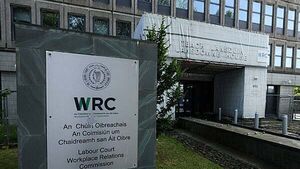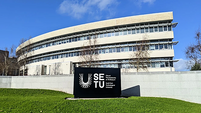Security firm to pay security guard compensation for 'vile' sexually threatening language used by colleague

Gordon Deegan
A security guard who alleged that he was subjected to sexually threatening language by a colleague up to and including a threat of anal rape and related violence has been awarded €7,500 compensation.
In the case, Workplace Relations Commission (WRC) Adjudicator, Pat Brady has found that Patrick Kinsella was subjected to ‘vile’ language by a work colleague.
Mr Brady has ordered Mr Kinsella's former employer, R.F.C Security Group to pay him €7,500 after finding that Mr Kinsella suffered sexual harassment arising from language used under the Employment Equality Acts.
Patrick Kinsella was employed by the company from January 18th 2024 until his resignation on March 28th 2025 and was for a time stationed at the Northside Shopping Centre in Dublin when subjected to alleged sexual harassment arising from words used by colleagues in three different incidents on October 14th 2024, late December 2024 and in late January 2025.
Mr Brady says that Mr Kinsalla alleged in the first episode on October 14th that very explicit and sexually threatening language was used, up to and including a threat of anal rape and related violence.
Mr Brady stated that while this may have been disputed by the alleged perpetrator, the allegation of sexual harassment is at least clear.
Mr Brady said: “The language alleged to have been used by the co-worker was vile.”
The employer did launch an investigation into Mr Kinsella’s complaints and Mr Brady said that the investigation, which for quite unacceptable reasons did not conclude until July 2025 did not uphold the allegations.
Mr Brady stated: “It was an unusual investigation in that, despite being triggered by the complainant‘s grievance it bizarrely contained almost as many complaints against him as were made by him.”
Mr Brady said: “In respect of the key allegations of sexual harassment both alleged perpetrators denied having made them, although one accepted that the comments about the complainant’s dental related speech problems had been made and this was held by the investigator to have been ‘poorly judged’; a totally inadequate euphemism for what actually transpired.”
Mr Brady said: “In general, the investigation found that the complaints made by the complainant failed for the want of corroboration.”
Mr Brady found that in this case, the comments Mr Kinsella alleged to have been made on October 14th “were so outrageous it is doubtful that any person would own up to having made them and some weight should have been given to this by the investigator”.
In his findings, Mr Brady stated that in relation to the incident on October 14th, 2024, he found that Mr Kinsella gave detailed and credible evidence on oath of what was said to him
Mr Brady said that what was said on October 14th “included a specific threat of serious sexual assault, as part of a generalised tirade against the complainant in respect of his speech problems”.
Mr Brady said that the excessively lengthy workplace investigation concluded that in the absence of corroboration, and given the denial by the alleged perpetrators, it could not uphold the allegations.
Mr Brady however stated: “I reach a different conclusion.I find that the complainant has made out a good prima facie case on the basis of his credible sworn evidence that the alleged perpetrators in his complaint acted in a way which had the effect of violating his right to dignity in the workplace and of sexually harassing him.”
Mr Brady found that the employer chose not to have the alleged perpetrators attend the hearing to offer alternative or rebuttal evidence, which is its choice.
He said that “the burden of proof having passed to it, the respondent has therefore failed to offer evidence to displace that burden”.
The employer denied the allegation of sexual harassment and stated that it acted fairly and promptly upon receiving Mr. Kinsella's complaint by initiating a formal internal investigation.
The employer maintains that Mr Kinsella voluntarily resigned and that there is no evidence of discriminatory or harassing conduct on the part of the company.
The employer stated that during his time with the company, Mr Kinsella was assigned to several client sites and a number of these assignments came to an end at the request of clients’ due issues about Mr. Kinsella's conduct and performance.
As a result of these issues, Mr. Kinsella was issued with a formal written warning on September 9th, 2024. This warning addressed his workplace behaviour and reminded him of the standards expected of all RFC Security employees.
The employer stated while some colleagues acknowledged that certain remarks may have been poorly judged, there was no evidence to support Mr. Kinsella's core allegations of bullying, harassment, or sexually inappropriate conduct.
The employer stated that in contrast, the investigation established that Mr. Kinsella had made racially inappropriate remarks over the site radio and had used threatening language toward colleagues.
The employer stated that these incidents were not denied and were supported by credible witness accounts.
At all times, RFC Security Group stated that it acted fairly, followed appropriate procedures, and sought to treat Mr. Kinsella with dignity and respect.security firm to pay security guard €7,500 compo for 'vile' sexually threatening language used by work colleague.





